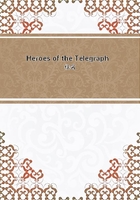
第19章
During this time Alfred Vail continued to improve the Morse apparatus, until it was past recognition. The porte-rule and type of the transmitter were discarded for a simple 'key' or rocking lever, worked up and down by the hand, so as to make and break the circuit. The clumsy framework of the receiver was reduced to a neat and portable size. The inking pen was replaced by a metal wheel or disc, smeared with ink, and rolling on the paper at every dot or dash. Vail, as we have seen, also invented the plan of embossing the message. But he did still more. When the recording instrument was introduced, it was found that the clerks persisted in 'reading' the signals by the clicking of the marking lever, and not from the paper. Threats of instant dismissal did not stop the practice when nobody was looking on. Morse, who regarded the record as the distinctive feature of his invention, was very hostile to the practice; but Nature was too many for him. The mode of interpreting by sound was the easier and more economical of the two; and Vail, with his mechanical instinct, adopted it. He produced an instrument in which there is no paper or marking device, and the message is simply sounded by the lever of the armature striking on its metal stops. At present the Morse recorder is rarely used in comparison with the 'sounder.'
The original telegraph of Morse, exhibited in 1837, has become an archaic form. Apart from the central idea of employing an electro-magnet to signal--an idea applied by Henry in 1832, when Morse had only thought of it--the development of the apparatus is mainly due to Vail. His working devices made it a success, and are in use to-day, while those of Morse are all extinct.
Morse has been highly honoured and rewarded, not only by his countrymen, but by the European powers. The Queen of Spain sent him a Cross of the Order of Isabella, the King of Prussia presented him with a jewelled snuff-box, the Sultan of Turkey decorated him with the Order of Glory, the Emperor of the French admitted him into the Legion of Honour.
Moreover, the ten European powers in special congress awarded him 400,000 francs (some 80,000 dollars), as an expression of their gratitude: honorary banquets were a common thing to the man who had almost starved through his fidelity to an idea.